PROVIDENCE, R.I.—Kyle Campbell’s vision for his future is as clear and crisp as a New England autumn afternoon.
After completing his undergraduate degree, he’ll establish an independent, nonprofit social services agency that focuses on meeting the needs of young people struggling to get ahead in hardscrabble neighborhoods—not unlike the one where he grew up. The program will combine deterrence, education and accountability in a street-level effort to reverse a trend that results in the incarceration of one out of six African-American men.
Campbell already knows the name he’ll hang on its shingle: the Juvenile Justice Diversion Initiative—never mind that the initiative has yet to serve a single person. The pieces are all in place: A plan, a detailed organizational chart and the determination to serve the community. Only one obstacle stands between Kyle Campbell and his objective: parole.
Imprisoned since age 17, the 40-year-old Campbell is serving a life term and has no idea when he will walk out of the John J. Moran Medium-Security Facility in Cranston, R.I.—or if that day will ever arrive.
Uncertainty about parole (and about his appeal on the grounds that he received an adult life sentence for murder as a juvenile) hasn’t deterred Campbell from honing the message he intends to drive home to the young men and women at the Juvenile Justice Diversion Initiative.
“I’m going to tell them about the men here who wish they knew then what they know now,” he says.
With 23 years on the inside, Campbell has had ample time to consider what he will say if he ever returns to the Providence neighborhoods of his youth. But it wasn’t until 2015 that Campbell began to formulate the vision of the future that is so clear to him now—a life of purpose and service, lived in a world beyond the perimeter wall and the razor wire. It was then, just last year, that Campbell was introduced to the College Unbound Prison Bridge Program. For him, and for 13 of his fellow inmates here at the Moran facility, the program indeed serves as a bridge to a far better future.
The program’s origins
The program is innovative and unconventional—in many ways, as unlikely as the connection between the two men behind its creation: Dennis Littky and James Monteiro. Littky, 72, is a nationally known educator who holds two doctorates from the University of Michigan and has spent nearly five decades as a passionate advocate for personalized learning. Monteiro, 47, is an eighth-grade dropout who spent most of his adult life in prison before earning two degrees and turning his life around. As founder and director of the Prison Bridge Program (PBP), Monteiro is now dedicated to helping others turn things around the same way he did.
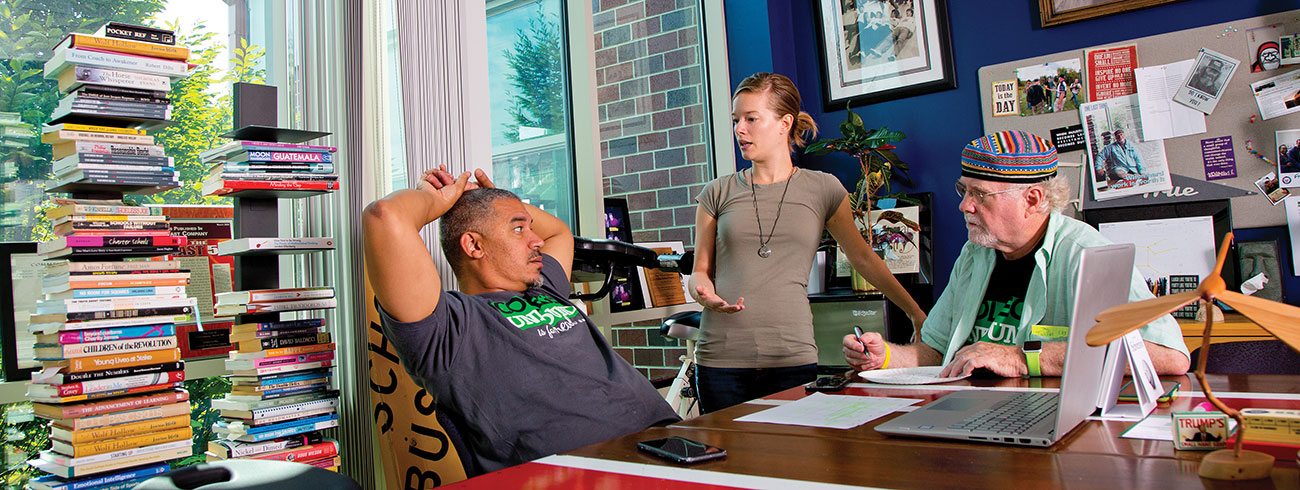
What Littky and Monteiro share, besides their history with PBP, is an unshakable belief that education is a key factor—the key factor—in the formula for success. Monteiro came to that realization the hard way, after being convicted of multiple felonies and spending some 20 years behind bars in five states. Toward the end of that dark period, while serving a 10-year sentence in a state prison in Baltimore, Monteiro saw a spark of light in a news story. He read about Andres Idarraga, an ex-offender from Rhode Island who, after his release, enrolled and graduated from Brown University and went on to earn a law degree from Yale.
“I was so amazed by that,” Monteiro recalls. “I couldn’t believe that someone from the ACI (Rhode Island’s Adult Correctional Institution) was going to Brown University and then to Yale. I just couldn’t believe it. That made me want to go back to school.”
Inspired and determined to change, Monteiro enrolled in college while incarcerated, earning an associate degree in psychology, with honors. Upon his release in 2009, Monteiro was eager to continue his turnaround story. “I didn’t want to get stuck in the cycle again,” he says. And so he returned home, to the Mount Hope neighborhood in Providence, determined to act on his commitment to build a workforce-development program for local youth. He also wanted to continue his postsecondary studies but, like many ex-offenders, he found that task wasn’t so easy on the outside.
“When I transitioned back home and I tried to go to school, it was nearly impossible,” Monteiro recalls. “I had to weigh between: ‘Do I go back and finish my (bachelor’s) degree or do I get a job and pay these bills?’”
Fortunately—and, in a way, thanks to Littky—Monteiro found a way to do both. While working as a nonprofit case manager and youth program coordinator, he enrolled at Roger Williams University through what was then a new program: College Unbound (CU), an innovative effort that Littky launched to better serve first-generation, low-income college students. Three semesters later, after earning his bachelor’s degree in community development, Monteiro found another job. Littky hired him to serve as an academic adviser in the CU program—in part because of Monteiro’s perspective as an ex-offender who had forged a new path and was eager to help others do the same.
“One of James’ projects as a College Unbound undergraduate was in starting a youth jobs program that was connected to issues around incarceration,” recalls Adam Bush, CU provost.
Throughout his time as a CU adviser, Monteiro says, he was nurturing the idea that would blossom into the Prison Bridge Program. Reflecting on his own post-prison pathway, he saw what most ex-offenders see: a tough road traversed in halting steps. It starts tentatively, with the actual release; then progresses to functional stability, and finally (and all too rarely) leads to what Monteiro calls “real freedom.”
“Freedom isn’t just about being out of prison. It’s about having adequate employment and support and being able to really compete out here in society.”
– James Monteiro, founder and director
of the Prison Bridge Program
“Freedom isn’t just about being out of prison,” he explains. “It’s about having adequate employment and support and being able to really compete out here in society.” Once fully free himself, Monteiro made it his mission to ensure that type of freedom was attainable for other ex-offenders.
“I did a whole lot of research about what would really make a good re-entry program,” he recalls. “I found out that there were lots of programs, but nobody was making the connection between what happens inside the prison and what happens outside. Lots of people take part in education behind the walls. The hard part comes when they get out.”
As part of his research, Monteiro talked to several people whose insights helped shape the Prison Bridge Program. In addition to CU’s educators, Monteiro consulted experts on incarceration at every level—from Rhode Island Department of Corrections Director A.T. Wall II to Andres Idarraga himself, the inmate-turned-attorney whose story had initially inspired him.
Armed with months of research, and with what he had learned from his own transition experience, Monteiro drew up a plan for the Bridge Program and took his idea to Littky.
Littky recalls the conversation.
“James told us, ‘Hey, there’s a lot of people going in and out of prison who are a lot smarter than me. Why don’t we start a specific program for them? Let’s work in the prisons; and most important, let’s make sure we’re there to help them on the day they get out. Let’s make sure they don’t get lost.’”
Littky was sold immediately. “I said, ‘Great!’ and James just took off with it,” Littky recalls. “He built it as a College Unbound initiative, within our structure, but he really built it himself.”
Monteiro and his CU colleagues agree that it’s the “bridge” portions of the Prison Bridge Program—the features designed to smooth students’ transition from prison to the outside world—that set it apart from other such efforts.
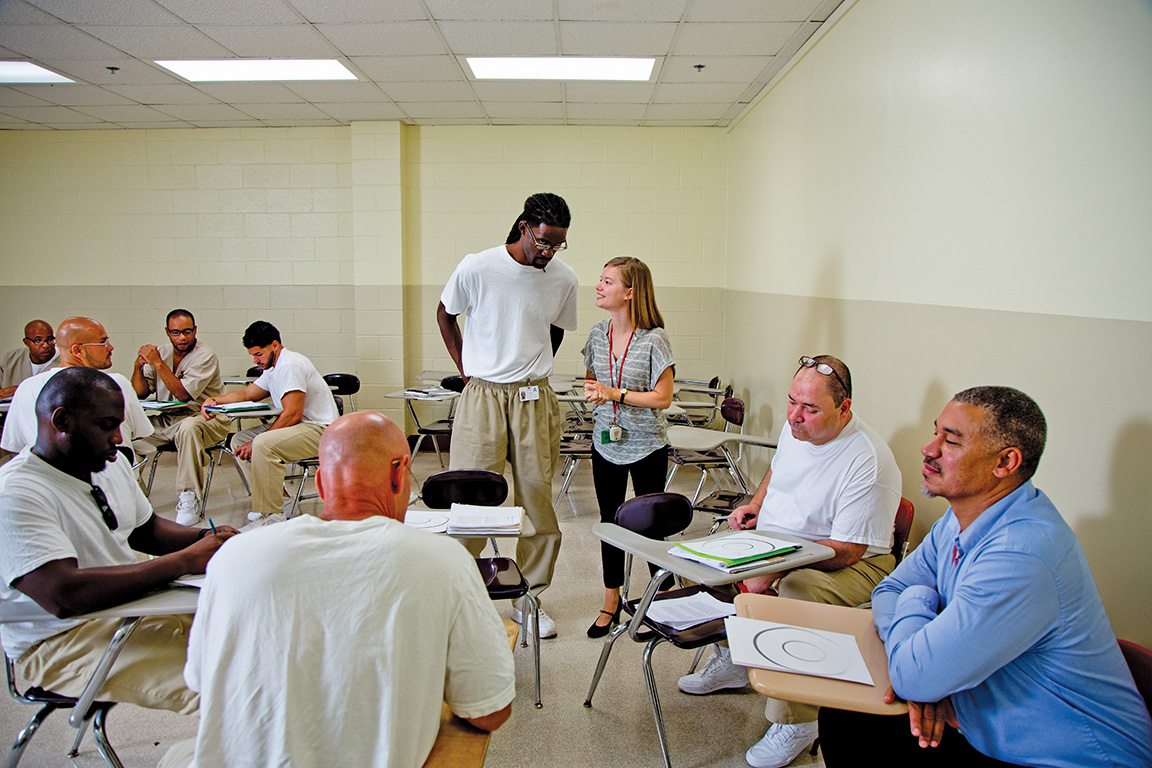
“The Bridge Program isn’t just College Unbound going into the prison to run a degree program or offer free credits. There are plenty of other programs and colleges that do that,” explains Provost Bush. The difference, he says, is that PBP is “fully enmeshed within a re-entry process—in the same way that (College Unbound) is totally enmeshed in our other students’ lives.”
That central idea behind CU—creating a highly personalized program—has long been a hallmark of Littky’s work, as ubiquitous as the colorful African kufi caps he favors. In 1995 Littky co-founded Big Picture Learning—an individualized middle and high school model in which, for example, a biography of LeBron James might be assigned reading for a student with a passion for basketball. The formula for determining NBA scoring averages could likewise find its way into that student’s math studies. The history of an NBA city would fulfill a social studies requirement.
The BPL model—pioneered in Providence on its primary campus, the Met Center—has proven successful for two decades and is now offered in 65 schools in 23 states and in 70 schools internationally.
In 2008, Littky decided to adapt this model to serve nontraditional students at the postsecondary level, and College Unbound was born.
A CU student typically enters the program after attaining prerequisite credits at a community college or other degree-granting institution. The program’s format rejects what Bush calls “an environment that tells people what to do. In higher education—and certainly behind prison walls—it is considered almost subversive to give students an opportunity that allows them the freedom to learn in their own way.”
CU has been approved by the Rhode Island Board of Higher Education and is moving toward regional accreditation. A Connecticut-based online institution, Charter Oak State College, is conferring CU degrees until the program is accredited. A timetable for awarding accreditation is not yet established.
The invitation for students to create their own courses of study is not all that sets College Unbound apart from the traditional higher education model. Standard classroom lessons are also absent. Instead, CU enrollees participate in collaborative, peer-to-peer instruction—an informal, small-group structure to accommodate the real lives of older learners, most of whom are working parents.
“Everyone says students have to be college-ready. Forget that,” Littky says. “What we’re saying is that colleges need to be student-ready.”
As he and his colleagues are learning with the Bridge Program, the value of that student-centered approach is even more apparent behind prison walls.
Kick-starting college
For as long as he remained incarcerated, Kyle Campbell limited his educational aspirations to the associate degree he obtained through Rhode Island Community College courses. The opportunity to earn a four-year degree existed, but the cost of tuition had to come from his own pocket, an expense out of reach for most inmates.
“I was practically stagnated,” Campbell says, “because getting a bachelor’s in here was almost impossible.”
His stalled education was kick-started the day the Rhode Island Department of Corrections invited residents of the medium-security unit (as well as other facilities) to apply for a spot in the Bridge Program. The program appealed to Campbell, not least because tuition was free. He signed on eagerly.
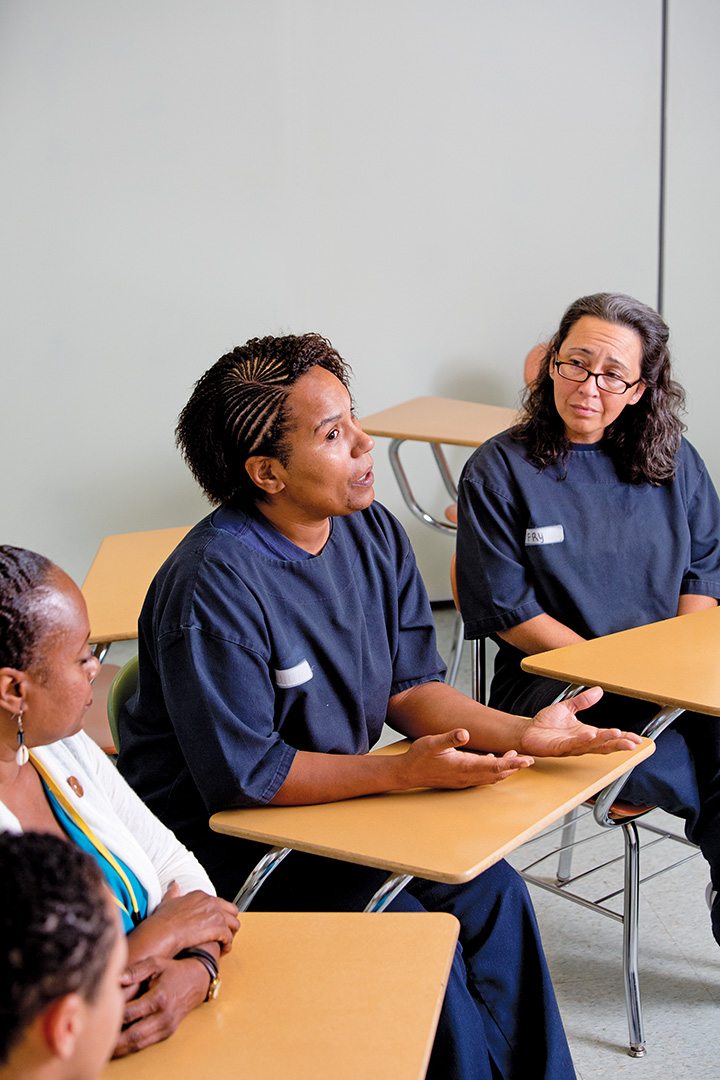
On a late August morning, Campbell and his 13 classmates filed into a drab classroom in the prison’s educational wing. The color of the cinderblock walls—beige—matched that of the inmates’ jumpsuits. Two large fans whirred futilely in the heavy, uncooled air.
The men took their seats in a semicircle around instructor Kaiya Letherer, assistant director of the Prison Bridge Program and herself a College Unbound graduate.
CU offers a single course per semester to a cohort of students, a group that moves sequentially—and together—toward a degree. Today’s course is titled “Globalization,” and as its name implies, it covers a lot of ground.
Letherer is technically the instructor, but “facilitator” is a more apt description. Globalization students, Letherer says, “have made the choice to begin the process of self-transformation.” Her role is to guide them through that process.
For the benefit of visitors—including Ralph Orleck, who directs education programs for the Rhode Island Department of Corrections—the Globalization class that morning outlined projects ranging from setting up a practice as a substance abuse counselor, to establishing a school to train service dogs, to operating a diner staffed by newly released inmates. The intent of each project was for participants to make amends for past transgressions.
“Most men in the program feel that if they give back to their community they are giving back to themselves,” says Campbell.
The projects of the eight classmates in the Rhode Island women’s unit Bridge Program convey that sense of purpose. “A lot of us have had horrible experiences in life that led us off track,” says student Kimberly Fry. “College Unbound helps us to think more reflectively and incorporate our past into a future to create a whole new ideal of ourselves.”
As PBP’s founder and director and an ex-offender himself, Monteiro believes the goals set out by the incarcerated can help them complete a circle. “It’s a ripple effect,” he says. “These guys are getting an education, and they want to go back to the communities where they caused problems to address social issues.”
In that way, the program conveys a potent message to inmates who otherwise would experience little beyond the tedium of prison. “It shows them that they can lead a meaningful life, support themselves and support their families,” says First Circuit U.S. Court of Appeals Judge Ojetta Rogeriee Thompson, a member of the College Unbound board. “It shows them how to have hope. Education is having the quality of your life changed.”
Been there himself
Monteiro, seated among the students, brings a quiet presence to every PBP class. At the medium-security unit, Monteiro’s blue shirt sets him apart from the rest of the men. He says little, but words aren’t necessary; his presence speaks volumes.
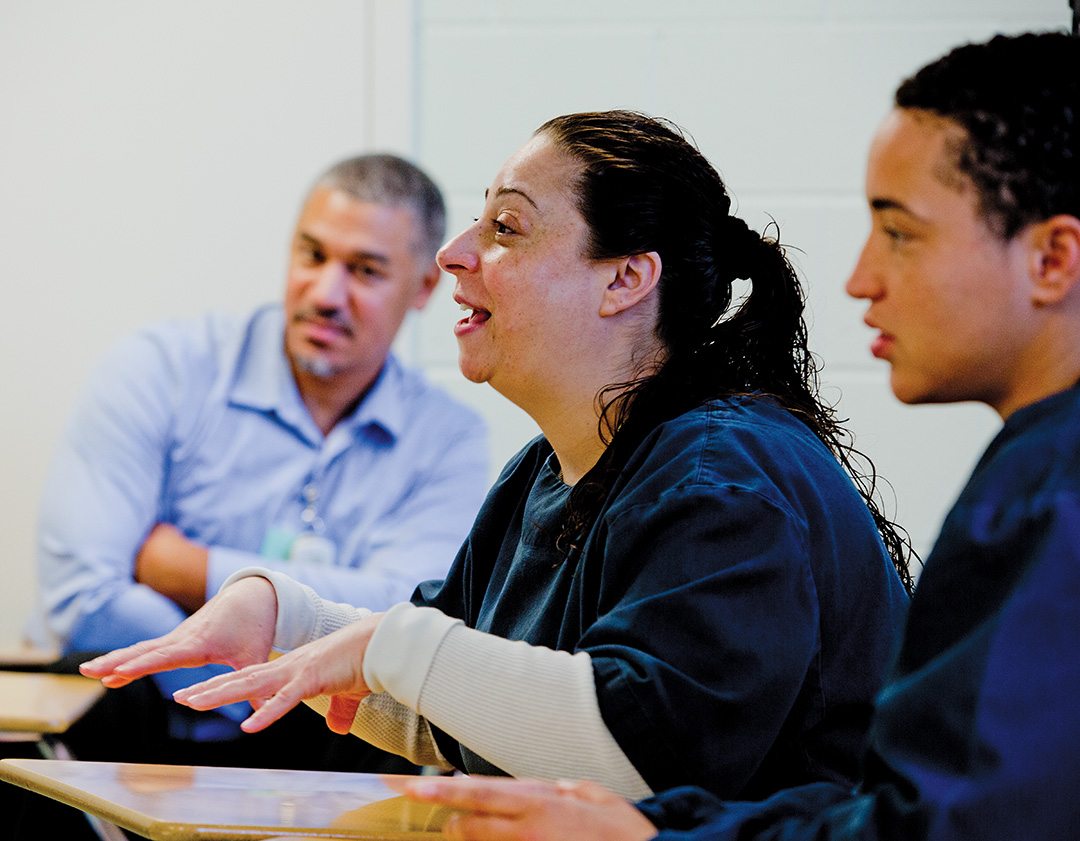
“James being one of us makes it a lot easier,” explained Fred Wilding, a former restaurant cook with a post-release plan to open a food truck that serves the homeless. “We’ve seen everything he has done, and we think, ‘If he can do it, why can’t we?’”
Monteiro understands both the practical and symbolic aspects of his position and his presence. “It’s motivation for them to see someone who has come from the (corrections) system,” he says.
Working in tandem for a little more than a year, Monteiro and Letherer have assembled and refined a program designed to serve a group of students whom Wall, without irony, calls “classic adult learners.”
As the nation’s longest-serving corrections director, Wall recalls a time when prison-based education programs essentially began and ended with the requirements for a high school equivalency certificate. He acknowledges that penal institutions, along with many of those housed within, once viewed learning behind bars with suspicion, if not disapproval. No more.
“In a sense it’s now cool to pursue an education here,” Wall says. “It is a sign of respect.” Proof that attitudes have changed can be seen in the fact that institutions’ commencement exercises now stretch over two days—a marked change from the handful of high school equivalency recipients in the past.
“In essence, adult basic education ended with earned GEDs,” says Wall. “It has become evident that there was a hunger for something more.”
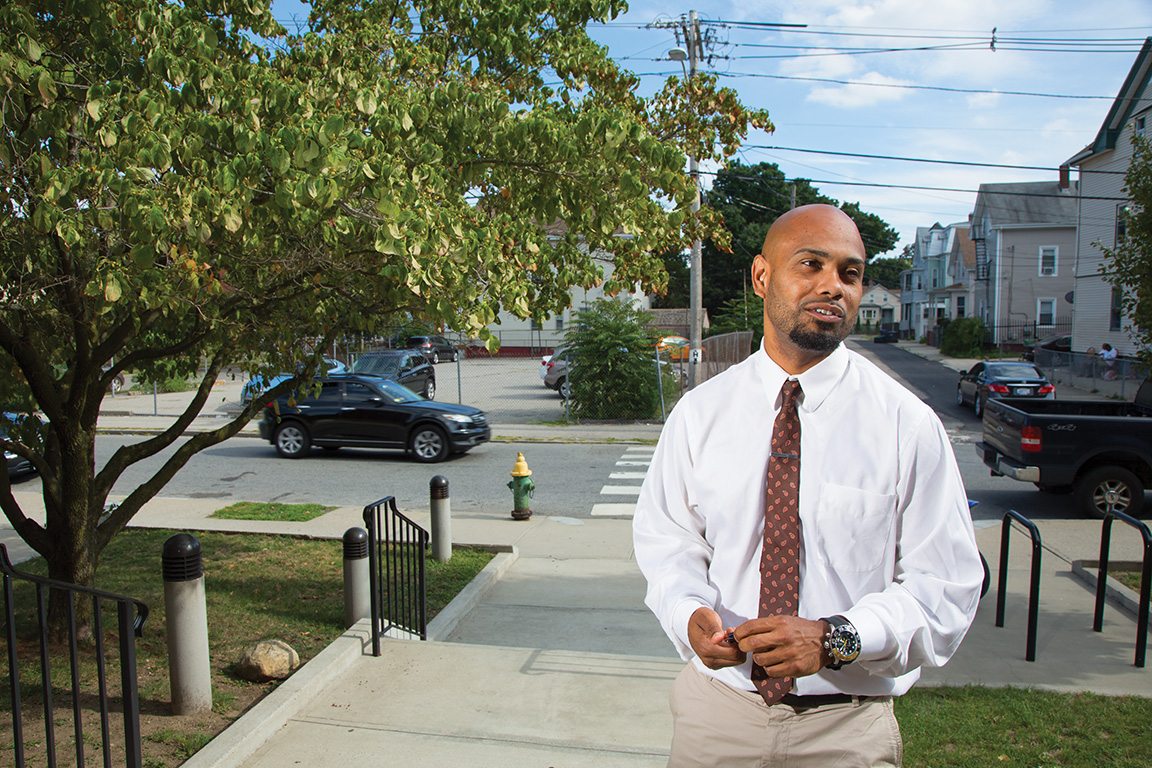
That hunger among the students is evident, Wall says, during his visits to the medium-security unit classes coordinated by Letherer. In most cases in the prison, he says, his arrival would prompt furtive, sidelong glances—a signal among employees and inmates that a high-ranking official is on the premises.
“But when I go into (PBP) classes, no one pays attention to me,” Wall says. “They are so immersed in their work that they aren’t distracted by the fact that ‘the man’ is there.”
Recidivism rates are monitored closely by those in Wall’s line of work. Repeat offenses are less common in Rhode Island than in other states, but the numbers are still cause for concern. The most recent study determined that 31 percent of the state’s parolees were standing before a judge within a year of release and nearly half —
48 percent—had somehow violated the terms of parole within three years. Nationally, two-thirds of ex-offenders have an encounter with law enforcement within three years of release—a rate that the National Institute of Justice says jumps to three out of four by the time five years have passed.
Parolee perseverance
For Bridge Program enrollees, the groundwork to slow recidivism is established in the classroom. Once released, it is incumbent on them to draw on their personal development—refined on the inside to persevere on the outside. And the staffer overseeing the transition, College Unbound Case Manager Wanda Brown, is there to assist the young men at every stride. Young men like Marquese Jones.
In and out of trouble since age 12, Jones hadn’t yet reached the age of consent before he entered the adult criminal justice system. “At 17, the court had had enough of my silliness,” recalls Jones, now 29. He was introduced to PBP last April, two weeks before his release, and the introduction couldn’t have come at a better time.

“Coming home with a felony, I knew the best thing to do was get an education,” says Jones. “My goals have always been negative; I’ve never had a positive goal.”
Enter Wanda Brown. The case manager took Jones under her wing the moment he returned to the Providence neighborhood where, as a teen, he’d known little but trouble.
“I never met Wanda before,” says Jones. “But she treated me as if she’d known me since I was a kid.” In the five months since his release, Jones had scrupulously avoided the traps that had landed him before so many judges in the past.
“I know the best way to stay out of trouble is to stay busy,” he says. “The more time I have, the more I get in trouble.”
He can (and does) thank Brown for limiting his idle time. It is she who makes sure Jones is constructively occupied when he’s not in a College Unbound classroom or at work. Since April—by phone, email and face-to-face encounters—Brown has been a constant presence in Jones’ life. She’s shown, through words and actions, that she believes in Marquese Jones. And for the first time in his life, Jones believes in himself.
“I know if I keep reading, keep studying and get a degree, I can do anything,” says Jones, already making inroads to work as a counselor in the Rhode Island Training School, the state facility for juvenile offenders.
The College Unbound team recognizes that the process of turning a life around begins with the individual.
“Everything begins with the mind and what you believe in,” says Chris Aina, a Brown protégé who juggles his College Unbound classes with a construction job—a job he sees as a stepping stone toward running his own contracting company.
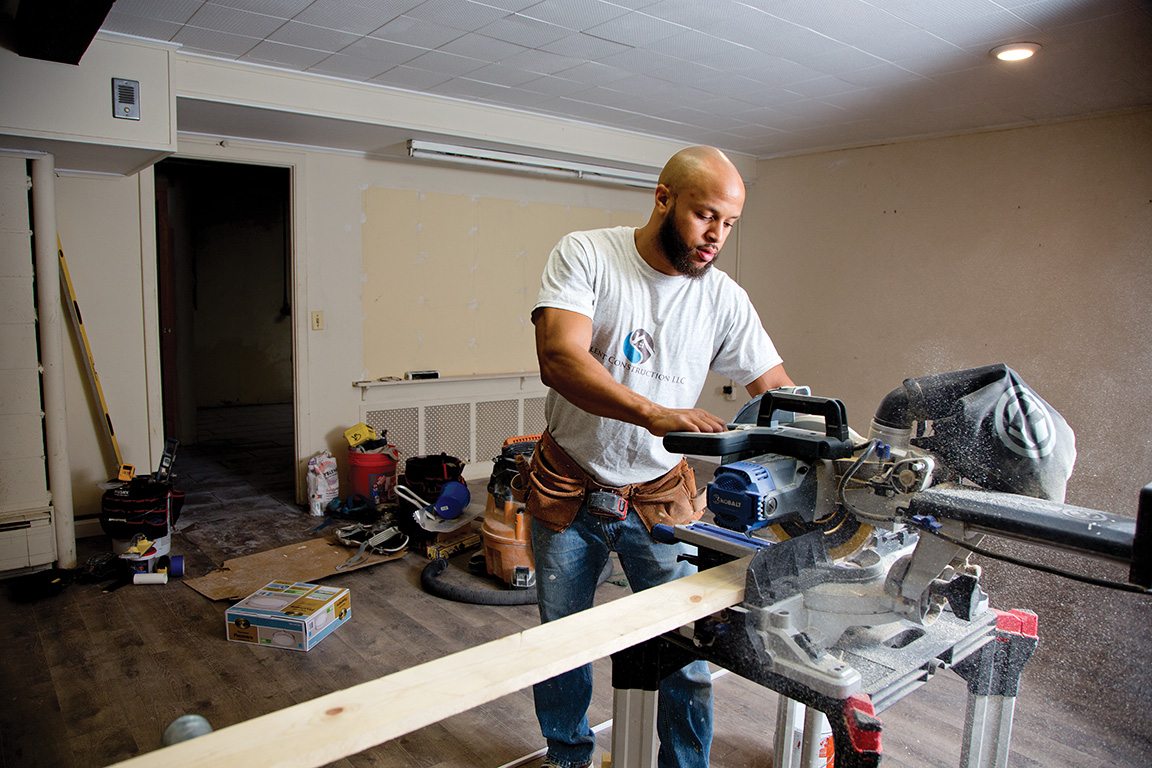
José Rodriguez is building something, too. He spent his formative years believing he was destined for nothing better than the dead-end jobs reserved for a middle-school dropout with a charge of attempted murder and a three-year stint in state prison on his record. The ease with which he attained an associate degree through College Unbound taught him otherwise. Today, a 33-year-old who once feared he’d “never make it to 21,” Rodriguez works as a case manager in Providence with the nonprofit Institute for the Study and Practice of Nonviolence.
On the rebound from a reversal, Rodriguez is back in College Unbound classrooms, moving toward his bachelor’s degree—and his studies come with a self-imposed deadline. If all goes per plan, Rodriguez and his daughter, Marilyn Resto, next spring will become the first parent-child combination to receive diplomas simultaneously from Littky-led programs—Rodriguez from College Unbound; Resto from Big Picture Learning.
College Unbound and the Bridge Program “retained a part of me I thought I’d lost by giving me an opportunity to position myself for post-prison success,” Rodriguez says. “I thought I’d lost everything, that the rest of my life would be meaningless. This program gave me hope and made me realize there is a part two to this story.”
![]()
